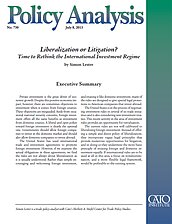Private investment is the great driver of economic growth. Despite this positive economic impact, however, there are sometimes objections to investment when it comes from foreign sources. These objections are misguided. Aside from occasional national security concerns, foreign investment offers all the same benefits as investment from domestic sources. A liberal and open policy toward foreign investment is clearly the optimal one. Governments should allow foreign companies to invest in the domestic market and should also allow domestic companies to invest abroad.
The United States has used international trade and investment agreements to promote foreign investment. However, if we examine the actual obligations in these agreements, we find the rules are not always about liberalization as it is usually understood. Rather than simply encouraging and welcoming foreign investment, and treating it like domestic investment, many of the rules are designed to give special legal protections to American companies that invest abroad.
The United States is in the process of negotiating investment rules in several of its trade initiatives and is also considering new investment treaties. This recent activity in the area of investment rules provides an opportunity for reevaluation.
The current rules are not well calibrated to liberalizing foreign investment. Instead of offering a simple and direct policy of liberalization, they incorporate vague legal principles that provide numerous opportunities for litigation, and in doing so they undermine the more basic principle of treating foreign and domestic investment equally. If international rules are to be used at all in this area, a focus on nondiscrimination, and a more flexible legal framework, would be preferable to the existing system.

